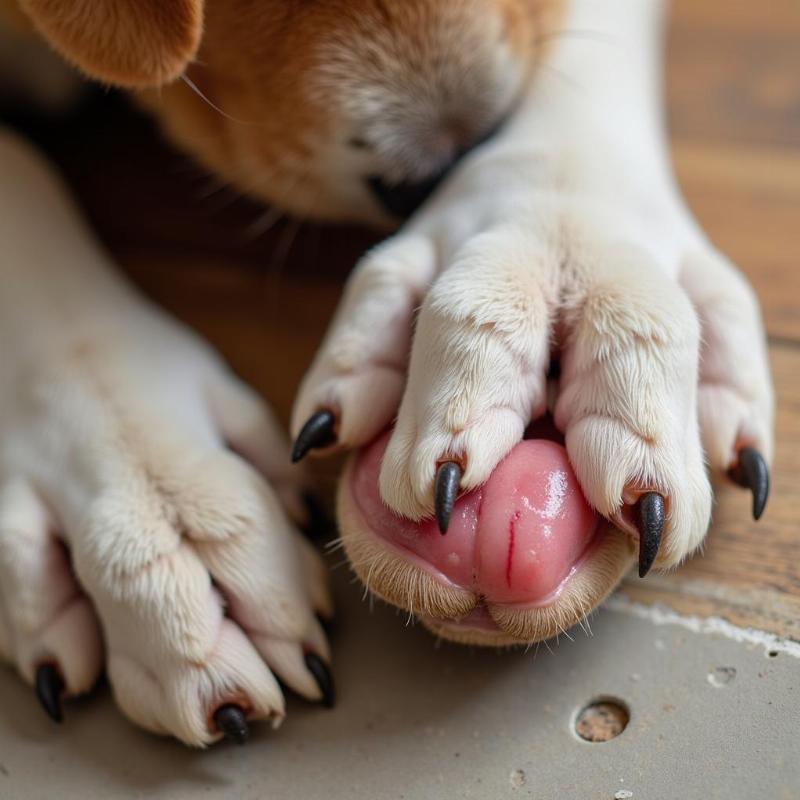If you’ve noticed your dog excessively licking, biting, or chewing on their dew claw, you’re not alone. This seemingly small behavior can be a sign of underlying issues ranging from minor irritation to serious infection. Understanding why your dog is chewing on their dew claw is crucial for providing appropriate care and preventing potential complications. This article will explore the common reasons behind this behavior, discuss when it’s time to seek veterinary attention, and offer practical advice on how to keep your furry friend’s dew claws healthy.
Why is My Dog Chewing Their Dew Claw?
Several reasons can lead to a dog obsessively chewing on their dew claw. One of the most common culprits is a simple injury. Because dew claws are positioned higher on the leg, they are more prone to snagging on objects like furniture, carpets, or even vegetation during walks. This can lead to tears, fractures, or ingrown nails, causing pain and discomfort that prompts your dog to lick and chew the affected area.
Another common reason is infection. The area around the dew claw can trap moisture and debris, creating a breeding ground for bacteria or fungi. Signs of infection include redness, swelling, discharge, and a foul odor. If you notice any of these symptoms, it’s essential to consult with a veterinarian as soon as possible.
 Dog Chewing Injured Dew Claw
Dog Chewing Injured Dew Claw
Allergies can also manifest as excessive chewing and licking. Environmental allergens like pollen, dust mites, or certain cleaning products can irritate the skin around the dew claw, causing your dog to chew in an attempt to relieve the itch. Food allergies can also trigger skin reactions, including inflammation around the dew claw.
When to Seek Veterinary Attention
While some instances of dew claw chewing may resolve on their own, others require professional veterinary care. If your dog’s chewing persists for more than a few days, or if you notice signs of injury or infection like bleeding, swelling, or pus, it’s crucial to schedule an appointment with your veterinarian.
Similarly, if the dew claw appears broken or deformed, immediate veterinary attention is necessary. Delaying treatment can lead to further complications and increased pain for your dog. Your veterinarian can diagnose the underlying cause of the chewing and recommend the appropriate treatment, which may include antibiotics, pain medication, or even surgical removal of the dew claw in severe cases.
Preventing Dew Claw Issues
Regular dew claw care can help prevent many of the problems that lead to chewing. Keeping the nails trimmed short can reduce the risk of snagging and injury. Be cautious when trimming, as cutting the quick can cause bleeding and pain. If you’re unsure how to trim your dog’s dew claws properly, consult your veterinarian or a professional groomer.
Regularly cleaning the area around the dew claw can also help prevent infection. Use a gentle pet-safe cleanser and warm water to remove dirt and debris. Thoroughly dry the area afterward to minimize moisture buildup.
Keeping Your Dog’s Paws Healthy
Beyond dew claw care, maintaining overall paw health is essential for your dog’s well-being. Regular paw checks can help you identify potential problems early on. Look for signs of dryness, cracking, redness, swelling, or foreign objects lodged between the paw pads.
Why does my dog constantly lick his dew claw?
Constant licking can indicate irritation, injury, or infection of the dew claw.
Can I remove my dog’s dew claw myself?
No, dew claw removal should only be performed by a veterinarian.
How can I stop my dog from chewing their dew claw?
Addressing the underlying cause is crucial. Consult a vet for diagnosis and treatment. A cone or protective boot can prevent further chewing while the area heals.
What are the signs of a dew claw infection?
Redness, swelling, pus, a foul odor, and excessive licking or chewing are signs of infection.
Are dew claws necessary for dogs?
While not essential for domesticated dogs, they can provide some stability and grip.
My dog’s dew claw is bleeding. What should I do?
Apply direct pressure to stop the bleeding and contact your veterinarian immediately.
How often should I trim my dog’s dew claws?
Trim your dog’s dew claws as needed, generally every few weeks, depending on how quickly they grow.
dog paws swollen and red, swollen dew claw on dog, what dog breeds don't have dewclaws, dog toys for hunting dogs
Beautdogs.us is your premier online resource for all things dog-related in the United States. We offer expert advice on dog breeds, grooming, training, health, nutrition, and much more. Whether you’re a seasoned dog owner or just starting your journey as a pet parent, Beautdogs.us provides reliable information and valuable resources to help you provide the best possible care for your canine companion. Contact us today for any inquiries or to learn more about our services. Email: [email protected], Phone: +1 501-555-7529.